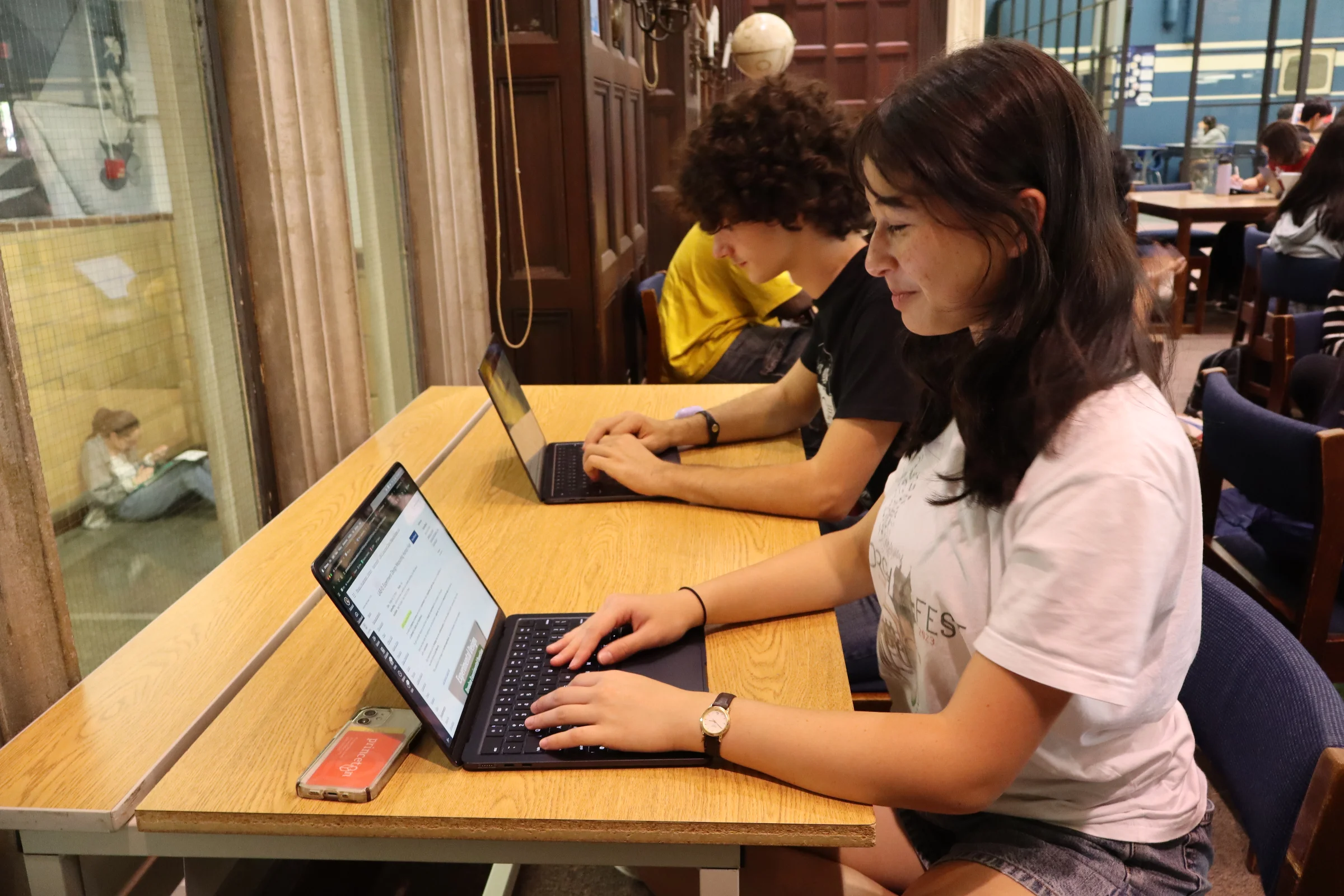PHS tech department distributes new MacBooks, with new restrictions, to students
September, 2025
Photo: Katherine Chen
Agatha Patten ‘27 and Benji Caswell Klein ‘27 work on their computers during Tiger Time.
The PHS technology department made significant changes for the 2025–2026 school year, including issuing new MacBooks for all students and with them, a ban on several popular sites like ChatGPT.
Towards the end of last school year, students returned their old MacBooks and chargers. Then, in August, students had to schedule an appointment in the afternoon to pick up their new device, the 2022 MacBook Air. PPS Chief Technology Officer Todd MacDonald explained that this cycle occurs every few years.
“The devices have significant battery deterioration [over time which is] the major issue. [And] as you can expect, students do beat up the devices over time. These devices ... require a lot of maintenance as battery life diminishes [and] it [eventually] becomes a situation where it’s a lot easier for us to replace the whole fleet [of MacBooks] than support one type of device over time,” said MacDonald.
The old MacBooks were sold to a third-party vendor, and the tech department used money acquired from that sale to buy the new devices. However, because the Apple brand is costly, the district had little flexibility in which model they could buy. In part to account for the cost of the MacBooks, the technology department switched device managers from a relatively expensive program called Jamf to a less costly manager called Mosyle.
Mosyle gives the technology team a better view of what sites are being accessed, and through this, they can decide which sites can be whitelisted for students to view. However, as MacBook distribution has only recently been finalized, the technology team has not had the opportunity to begin adjusting the filtering system of the device manager.
“[PHS students] may have experienced that they feel like the devices are locked down more. It’s not necessarily true. There’s a new filter in place, and some filters have different categories ... It hasn’t been tweaked yet based on what’s being requested. If students are requesting access [to a website] ... they should let us know because we review that [request] with the administration, with the curriculum office, and we’re in the business of trying to make learning accessible,” said MacDonald.
PPS has, however, decided to implement Mosyle’s academic dishonesty restrictions, resulting in many AI or AI-related sites being banned, including ChatGPT. Assistant Principal Rashone Johnson said that the ban is a result of complaints and conversations among teachers, administrators, and the Board of Education.
“We want you to be able to think critically. We want you to know how to do the proper research to be able to support whatever it is that you’re writing about or your opinion on something. [And] we want those thoughts to come from you,” said Johnson.
However, not all students are in complete agreement with the decision.
“I think [the new system] is a net positive in the sense of security, but it can also ... be used in an oppressive way. [Though] banning ChatGPT does stop students from using generative AI for school assignments, [it] also ... cuts off students’ capabilities for more creative uses of AI, similarly to how stopping students from using a calculator [in] math class just leaves them not being able to understand the full function of a calculator,” said Shriram Joshi ’28.
The PHS administration has installed AI usage posters specifying different levels of acceptable AI use, ranging from “none” to “AI-generated with editing,” in many classrooms, with the vast majority of teachers enforcing the “none” category. They administration created the posters based on feedback from teachers on AI usage by students.
“It gives us a common language that helps teachers discuss what level of AI is acceptable in their class, and it allows students to also think about how they’re using AI, whether they’re using it as a tool to supplement and enhance what they’re doing, or they’re using it as a crutch,” said U.S. history teacher Dr. Rick Miller.
Anna Soriano currently has her English I and English III students write essays in class to prevent the usage of AI, though she does acknowledge the power of the new technology.
“We use all sorts of assistive technology to help us throughout the day. I think that we need to prepare students for what’s coming, and they’re going to walk into a world where AI is everywhere,” said Soriano.